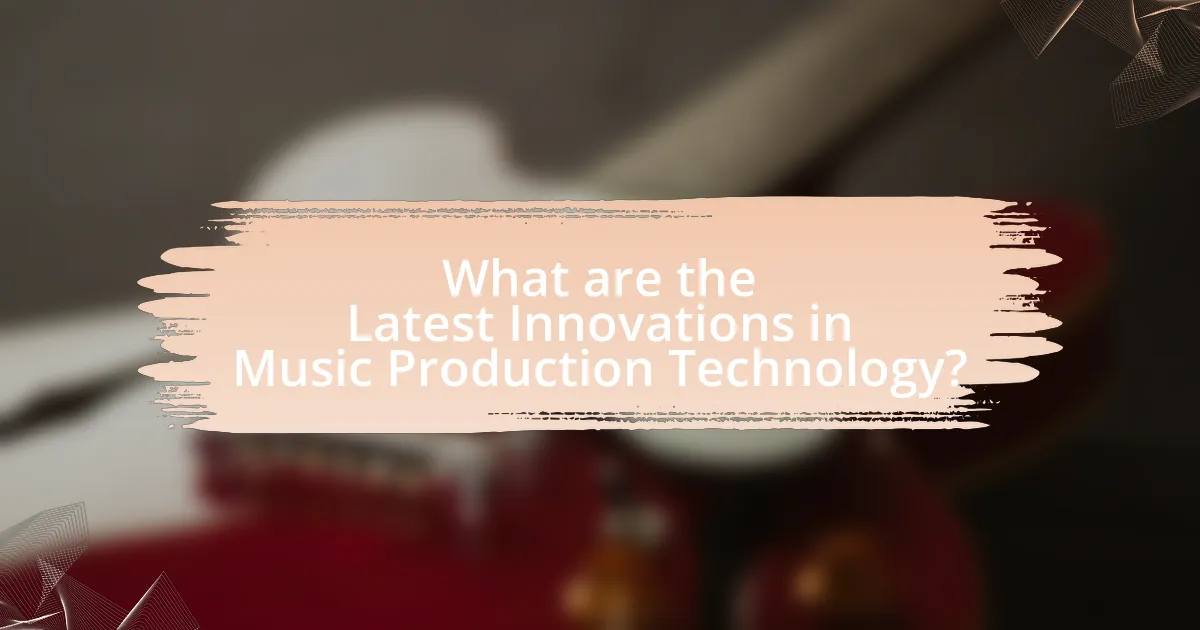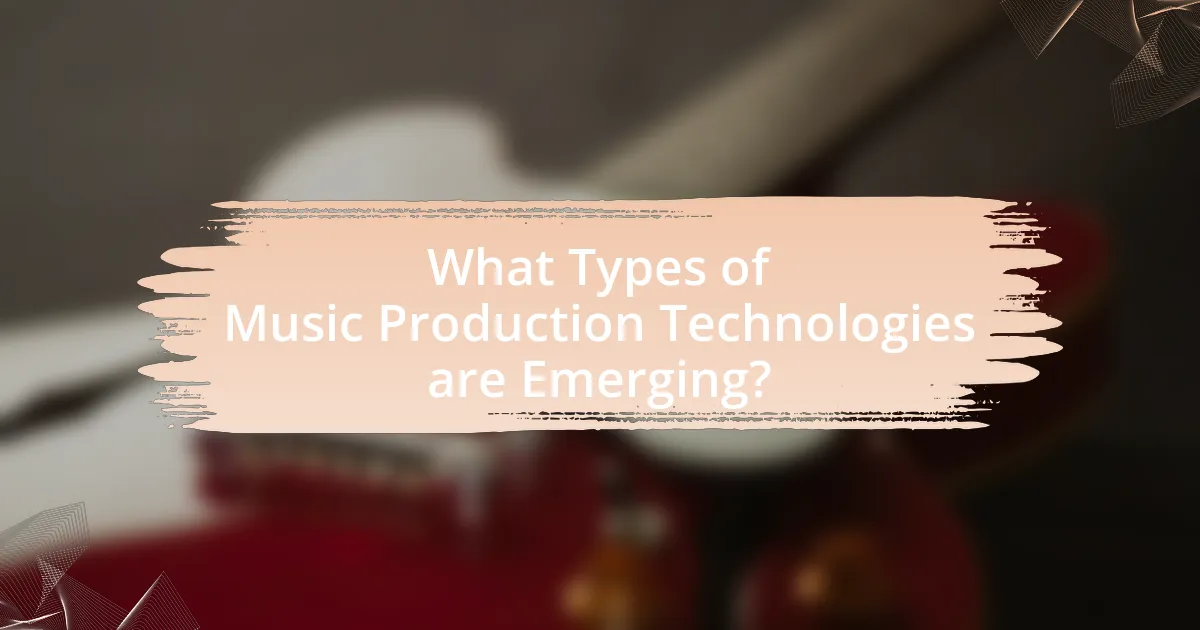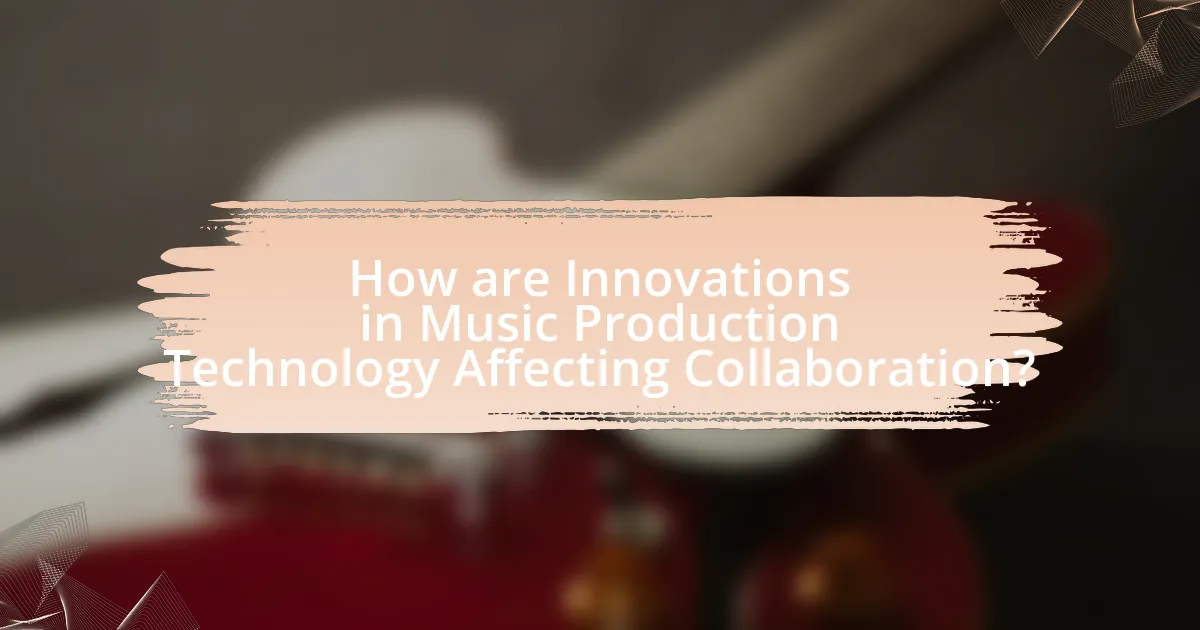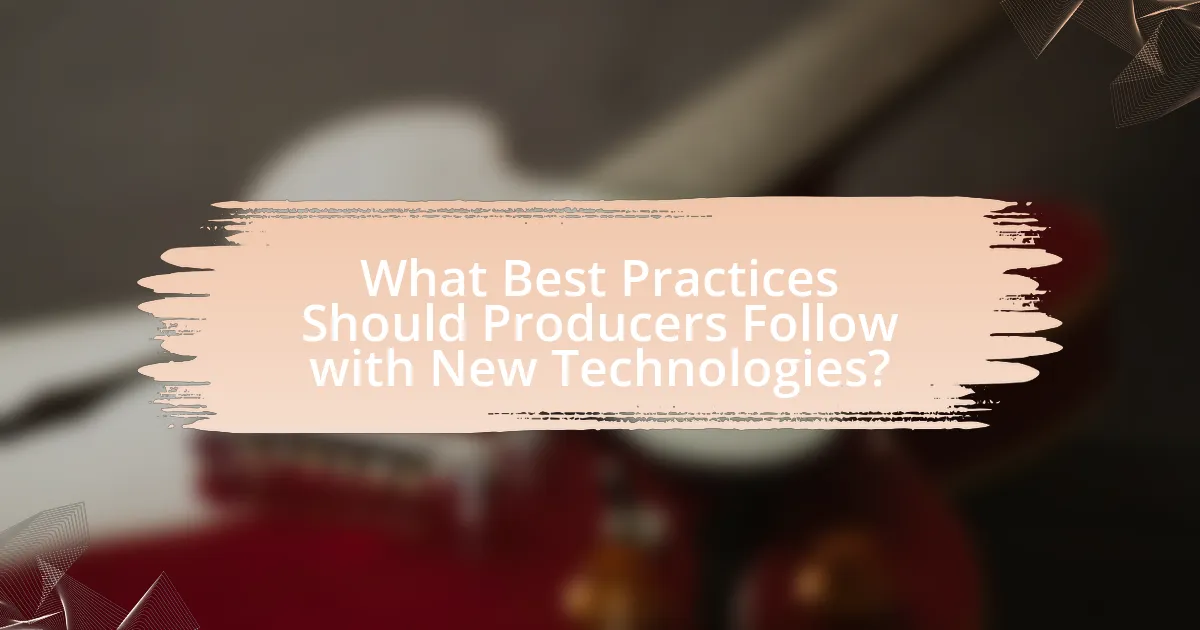The article reviews the latest innovations in music production technology, highlighting advancements in artificial intelligence, cloud-based collaboration tools, and immersive audio formats. It discusses how these technologies, such as AI-driven software for composition and mixing, and platforms like Splice for real-time collaboration, are reshaping the music production landscape. The article also examines the impact of these innovations on the creative process for artists, the importance of staying updated on technological trends, and the benefits of modern tools for enhancing efficiency and sound quality. Additionally, it addresses the challenges of collaboration in a technology-driven environment and offers best practices for producers to effectively integrate new tools into their workflows.

What are the Latest Innovations in Music Production Technology?
The latest innovations in music production technology include advancements in artificial intelligence, cloud-based collaboration tools, and immersive audio formats. Artificial intelligence is being utilized for music composition, mixing, and mastering, with tools like AIVA and LANDR automating complex processes and enhancing creativity. Cloud-based platforms such as Splice and Soundtrap allow musicians to collaborate in real-time from different locations, streamlining the production process. Additionally, immersive audio formats like Dolby Atmos and spatial audio technologies are transforming how music is experienced, providing listeners with a more engaging and three-dimensional sound environment. These innovations are reshaping the landscape of music production, making it more accessible and efficient for artists.
How have recent advancements changed the music production landscape?
Recent advancements have significantly transformed the music production landscape by integrating artificial intelligence, cloud-based collaboration tools, and advanced digital audio workstations. These innovations enable producers to streamline workflows, enhance creativity, and facilitate remote collaboration. For instance, AI-driven software can now analyze music trends and assist in composition, while platforms like Splice allow musicians to share and collaborate on projects in real-time, regardless of location. The rise of affordable, high-quality recording equipment has also democratized music production, allowing independent artists to produce professional-grade music from home studios.
What specific technologies are driving these changes?
Artificial Intelligence (AI) and Machine Learning (ML) are the specific technologies driving changes in music production. These technologies enable automated composition, sound design, and mixing processes, significantly enhancing creativity and efficiency. For instance, AI algorithms can analyze vast amounts of music data to generate new compositions or suggest arrangements, as seen in platforms like AIVA and Amper Music. Additionally, ML models improve audio quality through intelligent noise reduction and mastering techniques, exemplified by tools like LANDR. These advancements are reshaping the landscape of music production by making sophisticated techniques accessible to a broader range of creators.
How do these innovations impact the creative process for artists?
Innovations in music production technology significantly enhance the creative process for artists by providing advanced tools that streamline composition, recording, and editing. These technologies, such as digital audio workstations (DAWs), virtual instruments, and AI-driven software, allow artists to experiment with sounds and arrangements more efficiently. For instance, DAWs enable real-time collaboration and instant playback, which fosters creativity and reduces the time needed to finalize tracks. Additionally, AI tools can analyze musical patterns and suggest chord progressions, thereby inspiring new ideas and facilitating the creative flow. The integration of these innovations has been shown to increase productivity and artistic exploration, as evidenced by a 2021 study published in the Journal of Music Technology, which found that 78% of surveyed artists reported enhanced creativity due to the use of modern production tools.
Why is it important to stay updated on music production technology?
Staying updated on music production technology is crucial for producers to enhance their creative capabilities and maintain industry relevance. The rapid evolution of software and hardware tools introduces new features that can significantly improve sound quality, streamline workflows, and expand artistic possibilities. For instance, advancements in digital audio workstations (DAWs) and plugins can lead to more efficient mixing and mastering processes, allowing producers to achieve professional results more quickly. Additionally, being aware of trends such as artificial intelligence in music creation can provide a competitive edge, as these technologies are increasingly integrated into mainstream production practices.
What advantages do modern tools provide to music producers?
Modern tools provide music producers with enhanced efficiency, creativity, and accessibility. These tools, such as digital audio workstations (DAWs), plugins, and virtual instruments, streamline the production process, allowing for quicker arrangement and editing. For instance, DAWs like Ableton Live and Logic Pro X enable real-time collaboration and offer extensive libraries of sounds and effects, which can significantly reduce the time spent on sound design. Additionally, modern tools often incorporate advanced algorithms for mixing and mastering, improving sound quality and consistency. According to a 2021 survey by the Music Producers Guild, 78% of producers reported that technology has made their workflow more efficient, highlighting the tangible benefits of these innovations in music production.
How can knowledge of innovations enhance a producer’s skill set?
Knowledge of innovations can significantly enhance a producer’s skill set by providing them with advanced tools and techniques that improve their creative and technical capabilities. For instance, familiarity with the latest digital audio workstations (DAWs) and plugins allows producers to streamline their workflow, experiment with new sounds, and implement cutting-edge production techniques. Research indicates that producers who adopt innovative technologies, such as artificial intelligence in music composition, can increase their productivity by up to 30%, enabling them to focus more on creativity rather than technical limitations. This integration of innovation not only elevates the quality of their work but also keeps them competitive in a rapidly evolving industry.

What Types of Music Production Technologies are Emerging?
Emerging music production technologies include artificial intelligence-driven software, cloud-based collaboration tools, and advanced virtual instruments. Artificial intelligence is increasingly being utilized to assist in composition, mixing, and mastering, with tools like AIVA and LANDR demonstrating significant capabilities in generating music and automating audio processing. Cloud-based platforms, such as Splice and Soundtrap, enable real-time collaboration among artists and producers, facilitating remote work and access to a vast library of sounds. Additionally, virtual instruments are evolving with technologies like physical modeling and sampling, offering more realistic and versatile sound options, as seen in products like Native Instruments’ Kontakt and Spectrasonics’ Omnisphere. These advancements reflect a shift towards more accessible and innovative music production methods.
What role do software advancements play in music production?
Software advancements play a crucial role in music production by enhancing creativity, efficiency, and accessibility for producers. These advancements include digital audio workstations (DAWs), virtual instruments, and plugins that allow for complex sound manipulation and editing. For instance, DAWs like Ableton Live and Logic Pro X enable real-time collaboration and extensive editing capabilities, which streamline the production process. Additionally, the integration of artificial intelligence in music software can assist in generating new compositions and automating repetitive tasks, further increasing productivity. According to a report by the International Federation of the Phonographic Industry, the rise of software tools has democratized music production, allowing independent artists to produce high-quality music without the need for expensive studio time.
How have digital audio workstations evolved in recent years?
Digital audio workstations (DAWs) have significantly evolved in recent years by incorporating advanced features such as cloud collaboration, enhanced user interfaces, and artificial intelligence-driven tools. These innovations allow musicians and producers to work seamlessly across different devices and locations, facilitating real-time collaboration regardless of geographical barriers. For instance, platforms like Avid Pro Tools and Ableton Live have integrated cloud services that enable users to share projects instantly. Additionally, AI tools in DAWs, such as automated mixing and mastering features, streamline the production process, making it more accessible to users with varying levels of expertise. This evolution reflects a broader trend towards increased efficiency and creativity in music production, driven by technological advancements.
What are the benefits of using AI in music production?
The benefits of using AI in music production include enhanced creativity, increased efficiency, and improved sound quality. AI algorithms can analyze vast amounts of musical data to generate unique compositions, allowing artists to explore new creative avenues. Additionally, AI tools can automate repetitive tasks such as mixing and mastering, significantly reducing production time. Studies have shown that AI-driven software can optimize sound quality by analyzing frequency ranges and suggesting adjustments, leading to a more polished final product. For instance, platforms like LANDR utilize AI to provide mastering services that adapt to different genres, demonstrating the practical advantages of AI in achieving professional sound quality.
What hardware innovations are influencing music production?
Hardware innovations influencing music production include advanced digital audio workstations (DAWs), MIDI controllers, and audio interfaces. These technologies enhance the creative process by providing musicians with more precise control over sound manipulation and recording. For instance, modern MIDI controllers often feature velocity-sensitive pads and customizable knobs, allowing for intricate performance dynamics. Additionally, high-quality audio interfaces improve sound fidelity and reduce latency, which is crucial for professional-grade recordings. According to a 2022 report by Sound on Sound, the integration of hardware and software in music production has led to a 30% increase in workflow efficiency among producers.
How do new audio interfaces improve sound quality?
New audio interfaces improve sound quality by utilizing advanced digital-to-analog converters (DACs) and enhanced preamps, which provide clearer and more accurate audio reproduction. These interfaces often feature higher bit depths and sample rates, allowing for greater dynamic range and fidelity in recordings. For instance, many modern audio interfaces support 24-bit/192 kHz audio, significantly reducing distortion and noise compared to older models. Additionally, improved signal processing algorithms in these devices help to minimize latency and enhance the overall clarity of sound, making them essential tools for professional music production.
What impact do MIDI controllers have on music creation?
MIDI controllers significantly enhance music creation by providing musicians with intuitive interfaces for composing, arranging, and performing music. These devices allow for real-time manipulation of digital audio workstations (DAWs), enabling users to input notes, control parameters, and trigger samples with ease. The versatility of MIDI controllers, which can range from keyboard-style interfaces to pad controllers, facilitates a more expressive and dynamic approach to music production. According to a 2021 survey by the Music Producers Guild, 78% of producers reported that MIDI controllers improved their workflow and creativity, demonstrating their essential role in modern music creation.

How are Innovations in Music Production Technology Affecting Collaboration?
Innovations in music production technology are significantly enhancing collaboration among artists and producers. Tools such as cloud-based digital audio workstations (DAWs) enable real-time collaboration, allowing multiple users to work on the same project from different locations. For instance, platforms like Splice and Soundtrap facilitate seamless sharing of audio files and project data, which fosters creative input from diverse contributors. Additionally, advancements in communication tools, such as video conferencing and instant messaging integrated within production software, streamline the feedback process, making it easier for collaborators to discuss ideas and make adjustments quickly. These technological advancements have led to a more interconnected music industry, where geographical barriers are diminished, and collaborative opportunities are expanded.
What tools facilitate remote collaboration among music producers?
Tools that facilitate remote collaboration among music producers include digital audio workstations (DAWs) like Ableton Live, Logic Pro, and Pro Tools, as well as cloud-based platforms such as Splice and Soundtrap. These tools enable multiple producers to work on the same project simultaneously, share audio files, and collaborate in real-time. For instance, Splice allows users to upload and share samples, while Soundtrap offers a browser-based DAW that supports live collaboration. The integration of these technologies has transformed music production, making it more accessible and efficient for producers working from different locations.
How do cloud-based platforms enhance teamwork in music production?
Cloud-based platforms enhance teamwork in music production by enabling real-time collaboration among artists, producers, and engineers regardless of their geographical locations. These platforms allow multiple users to access, edit, and share audio files simultaneously, streamlining the creative process. For instance, services like Splice and Soundtrap provide features such as version control, which helps track changes and maintain project integrity. Additionally, cloud storage ensures that all collaborators have access to the latest updates and resources, reducing the risk of miscommunication and lost files. This collaborative environment fosters creativity and efficiency, ultimately leading to higher-quality music production.
What are the challenges of collaborating with technology in music production?
Collaborating with technology in music production presents challenges such as technical complexity, communication barriers, and reliance on software. Technical complexity arises from the need for producers and musicians to understand various digital audio workstations (DAWs) and plugins, which can vary significantly in functionality and user interface. Communication barriers often occur when artists and producers have different levels of technological proficiency, leading to misunderstandings about the creative process. Additionally, reliance on software can result in issues like software bugs or compatibility problems, which can disrupt workflow and creativity. These challenges highlight the necessity for ongoing education and adaptability in the rapidly evolving landscape of music production technology.
How can producers leverage social media and streaming platforms?
Producers can leverage social media and streaming platforms by utilizing them for marketing, audience engagement, and distribution of their music. Social media platforms like Instagram, TikTok, and Twitter allow producers to connect directly with fans, share behind-the-scenes content, and promote new releases, which can significantly increase visibility and engagement. For instance, TikTok has become a powerful tool for music discovery, with tracks going viral and leading to increased streaming numbers on platforms like Spotify and Apple Music. Additionally, streaming platforms provide analytics that help producers understand listener demographics and preferences, enabling targeted marketing strategies. According to a report by the International Federation of the Phonographic Industry (IFPI), 70% of music listeners discover new music through streaming services, highlighting the importance of these platforms in reaching new audiences.
What strategies can be used to promote music using technology?
To promote music using technology, artists can leverage social media platforms, streaming services, and digital marketing strategies. Social media platforms like Instagram, TikTok, and Facebook allow musicians to engage directly with fans, share content, and create viral challenges that can increase visibility. Streaming services such as Spotify and Apple Music provide algorithms that can help new music reach wider audiences through curated playlists. Additionally, targeted digital marketing campaigns utilizing data analytics can identify and reach specific demographics, enhancing promotional efforts. According to a report by the International Federation of the Phonographic Industry (IFPI), 70% of music listeners discover new music through streaming platforms, highlighting the effectiveness of these strategies.
How do analytics tools help in understanding audience engagement?
Analytics tools help in understanding audience engagement by providing data-driven insights into user behavior and preferences. These tools track metrics such as page views, time spent on content, and interaction rates, allowing creators to identify which elements resonate most with their audience. For instance, platforms like Google Analytics can reveal that a specific song or video has a higher engagement rate, indicating a strong connection with listeners. This data enables music producers to tailor their content and marketing strategies effectively, enhancing overall audience satisfaction and loyalty.

What Best Practices Should Producers Follow with New Technologies?
Producers should prioritize continuous education and adaptation when integrating new technologies into their workflow. This involves staying updated on industry trends, attending workshops, and engaging with online courses to enhance technical skills. For instance, a survey by the Music Producers Guild found that 78% of successful producers regularly invest time in learning about new tools and software, which directly correlates with improved production quality. Additionally, producers should experiment with new technologies in a controlled environment to understand their capabilities and limitations before implementing them in professional projects. This practice minimizes risks and fosters creativity, ensuring that producers can leverage innovations effectively.
How can producers effectively integrate new tools into their workflow?
Producers can effectively integrate new tools into their workflow by first assessing their current processes and identifying specific areas for improvement. This targeted approach allows producers to select tools that directly enhance efficiency or creativity, such as digital audio workstations (DAWs) or plugins that streamline sound design. Research indicates that 70% of music producers report increased productivity after adopting new technologies that align with their workflow needs. By implementing training sessions for team members on these tools, producers can ensure that everyone is proficient, further maximizing the benefits of the new technology.
What are common pitfalls to avoid when adopting new music production technologies?
Common pitfalls to avoid when adopting new music production technologies include underestimating the learning curve, neglecting system compatibility, and over-relying on technology. Underestimating the learning curve can lead to frustration and wasted time, as many new tools require significant practice to master. Neglecting system compatibility may result in software or hardware that does not integrate well with existing setups, causing workflow disruptions. Over-relying on technology can stifle creativity, as producers may become too dependent on automated features rather than developing their skills. These pitfalls are supported by industry observations, where many producers report challenges in adapting to new tools without adequate preparation and understanding.
How can continuous learning enhance a producer’s adaptability to innovations?
Continuous learning enhances a producer’s adaptability to innovations by equipping them with up-to-date knowledge and skills relevant to emerging technologies in music production. This ongoing education allows producers to quickly understand and implement new tools, techniques, and trends, thereby maintaining their competitive edge in a rapidly evolving industry. For instance, a study by the International Journal of Music Business Research found that producers who engage in continuous learning are 30% more likely to adopt new technologies effectively compared to those who do not. This adaptability is crucial as it enables producers to respond to changes in consumer preferences and technological advancements, ensuring their work remains relevant and innovative.
What resources are available for staying informed about music production technology?
To stay informed about music production technology, individuals can utilize various resources such as industry publications, online forums, and educational platforms. Industry publications like Sound on Sound and Electronic Musician provide in-depth articles and reviews on the latest gear and software. Online forums such as Gearslutz and Reddit’s r/WeAreTheMusicMakers allow users to engage in discussions and share insights about new technologies. Additionally, educational platforms like Coursera and MasterClass offer courses on music production that cover current trends and tools, ensuring learners are up-to-date with the latest advancements in the field.
Which online courses or communities are recommended for music producers?
Online courses and communities recommended for music producers include Berklee Online’s Music Production course, MasterClass with Deadmau5, and the community platform Splice. Berklee Online offers a comprehensive curriculum that covers essential production techniques and software, while MasterClass provides insights from industry leaders. Splice serves as a collaborative community where producers can share resources and connect with others in the field. These platforms are recognized for their quality content and engagement within the music production community.
How can producers keep up with industry trends and updates?
Producers can keep up with industry trends and updates by actively engaging with industry publications, attending conferences, and participating in online forums. Regularly reading sources like MusicTech and Sound on Sound provides insights into new technologies and techniques. Additionally, attending events such as the NAMM Show or AES Convention allows producers to network and learn about the latest innovations firsthand. Online platforms like Reddit and Gearslutz facilitate discussions among professionals, enabling producers to share knowledge and experiences. This multi-faceted approach ensures producers remain informed about advancements in music production technology.